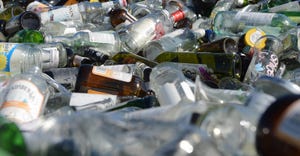States Called on to Lead in Plastic Reduction Policy in Anticipation of Federal Opposition to Regulations
States are taking the lead in addressing plastic waste, as federal progress on regulating plastic production and disposal remains slow and contentious. Advocates recommend beginning with proven strategies like beverage container deposit-refund programs, while extended producer responsibility (EPR) laws for packaging require careful planning and transparent implementation to avoid pitfalls and industry pushback.
.png?width=1280&auto=webp&quality=95&format=jpg&disable=upscale)
Getting federal laws passed is a slow, arduous, and sometimes messy process, so states commonly lead on policies that matter to them by crafting their own rules. Legislation to curb the flow of plastic waste is no exception.
With an incoming pro-oil and gas production White House administration, ambitious states and local governments will have to work harder, say organizations and policy makers fighting to slow plastic production and its end-of-life consequences.
Advocates who have helped develop and push through plastic packaging laws share advice here. And a U.S. representative updates on a federal bill he has been working on—and plan B if the bill stalls.
States aiming to take on plastic packaging should begin with beverage container deposit-refund programs, says Heidi Sanborn, executive director of the National Stewardship Action Council.
The business case for collecting bottles and cans—whether plastic, glass or metal— is enormous. Yet manufacturers are not maximizing these materials because, while they want them, little volume is collected and fed to them, Sanborn says.
The Can Manufacturers Institute, Glass Packaging Institute, and Association of Plastic Recyclers have lobbied for beverage container refund programs. And supporting infrastructure already exists—at least in the 10 states where these systems are up and running.
The approach has proven effective. Bottle bill states recycle on average 74 percent of their recovered containers compared to the national average of 35 percent, according to the Container Recycling Institute.
Sanborn cautions states to not start out of the gate trying to carve out extended producer responsibility (EPR) legislation, a robust policy approach that holds producers responsible for their products throughout their lifecycle. The plastics industry generally opposes EPR.
“If you start with plastic packaging, the biggest industry group, the biggest material group, and biggest material category, you are taking on the biggest lobby.
“Few legislators and stakeholder groups understand EPR, while the industry does, and they are organized, which means states can easily end up losing control of the system,” Sanborn says, warning of the risk of compromised transparency and accountability.
Developing and passing EPR legislation, then finetuning the stewardship programs takes years. In fact, all four states who signed packaging EPR into law –Maine, Oregon, Colorado, and California—have yet to launch their programs: it’s a work in progress.
Sanborn believes the way to go is to wait and watch these systems play out.
“We need to first see how it works, or we will miss the opportunity to fix problems in future bills that we do not even know are there yet. So let us let these four states implement them and see what we learn,” she says.
Maine was the first state to pass a bottle bill. The New England state went on to develop and pass packaging EPR, a process that began in 2019 with a resolve bill to get the ball rolling. The final law passed in 2021, and the stewardship program should launch in 2026, says Sarah Nichols, an environmental policy and campaign consultant who formerly worked for Maine’s Natural Resources Council (NRCM). Nichols led the EPR advocacy campaign and helped develop the law’s language.
She echoes Sanborn’s thoughts around accountability.
“There needs to be super transparent data available to regulators, enforceable penalties for non-compliance, as well as specific definitions that don't inadvertently allow for more, thicker plastic to enter the market under the guise of "reuse" like we've seen with the plastic bag laws."
She developed a toolkit so other states would not have to reinvent the wheel. Among key takeaways:
1.Create a campaign name with clear and resonating messaging.
NRCM went with “Recycling Reform for Maine” with a tagline “More Effective. More Sustainable. More Equitable.”
“We felt “Recycling Reform” was the right choice, even though other key goals of packaging EPR include reduction and reuse. Centering the message on recycling is powerful, because people get it. We went with “reform” because it captured what this kind of bill really does: create systemic change,” Nichols says.
2.Build a broad coalition of supporters.
Have conversations with environmental organizations, municipalities/associations involved with recycling or financing recycling, materials recovery facility operators, and haulers. They all stood behind Maine’s EPR legislation, with the state’s largest recycler, ecomaine, among the most influential voices.
“They saw the potential to save money for towns, increase recycling rates, and reduce contamination. ecomaine’s support sent a clear signal to lawmakers and others that this was a good policy,” Nichols says.
3.Do not underestimate the opposition.
The Consumer Brands Association and some of its members such as Procter & Gamble fiercely opposed Maine’s bill.
“They pressured lawmakers to oppose it. As it moved forward, they pressed hard for sweeping exemptions, and then tried to get our governor to veto it,” Nichols says.
Maine’s first try halted abruptly just as the bill was set to move to the House floor when the legislature shut down in the face of COVID-19. There’s a lesson in that Nichols says: “If you aren’t successful the first time for whatever reason, keep trying.”
More states and municipalities are forging ahead on the plastic reduction front, looking into banning film shopping bags, straws, and other single-use plastics. But environmental policy advocates are expecting the chemical industry to move to ban the bans.
They are bracing for more tension at the federal level. Plastic reduction proponents expect the Trump administration to support chemical recycling over source reduction and to back government subsidies to advance the technologies.
And they anticipate other clashes.
Already a proposed federal bill could weaken states’ power, Sanborn says. The draft bill regarding truth in labeling could potentially pre-empt California’s SB 343, which cracks down on misleading uses of the chasing arrows symbol.
Governor Gavin Newsom recently called a special session to discuss strategies to stand up to federal pre-emption. Sanborn anticipates more states will follow suit.
U.S. Representative Jared Huffman has introduced and led several federal bills aiming to curb plastic production and waste, including the Protecting Communities from Plastics Act (an offshoot of the Break Free from Plastic Pollution Act).
The bill was introduced in the last session of Congress and the plan is to reintroduce it during the next session.
The belief is that the bill as a standalone is unlikely to move in a Republican House, so the strategy has been to parse out parts that can be incorporated into amendments or inform other bills, Huffman says.
“With Republicans in control of the House of Representatives, we have continued to work with stakeholders to ensure that the bill is ambitions but practical, informed by best practices both in the U.S. and around the world, and built on the latest science,” he says.
It will be hard to push through federal plastic regulation.
“But we are not powerless,” he says.
"We just need a few Republican votes in the House and Senate to have leverage over the administration. We need subnational players, including businesses, NGO’s, and especially states and local governments to step up, take the lead, and keep steady progress.”
Read more about:
LegislationAbout the Author
You May Also Like




